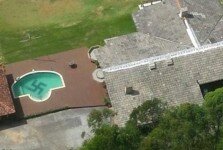
CAIRO — Fifteen years after allegedly helping al-Qaida plot the 1998 bombings of U.S. embassies in Kenya and Tanzania, Abu Anas al-Libi parked his car on a quiet street in Libya’s capital.
Within moments, soldiers from the U.S. Army’s elite Delta Force forced him at gunpoint into a van and sped away. They’d fly him to a naval ship in the Mediterranean Sea before finally taking him to New York to stand trial on charges of helping kill 224 people, including a dozen Americans, and wound more than 4,500.
But al-Libi, who pleaded not guilty to the charges against him, wouldn’t live to see his trial start on Jan. 12. He died last night in a New York hospital of complications stemming from a recent liver surgery, his wife and authorities said yesterday. He was 50.
Al-Libi, once wanted by the FBI with a $5 million bounty on his head, was chronically ill with hepatitis C when the soldiers seized him.
“I accuse the American government of kidnapping, mistreating and killing an innocent man. He did nothing,” said his wife, Um Abdullah.
In a federal court filing yesterday, U.S. Attorney Preet Bharara said al-Libi died after being taken from New York’s Metropolitan Correctional Center to a local hospital.
U.S. prosecutors in 2000 described al-Libi as sitting on a council that approved terrorist operations for al-Qaida, which would become infamous worldwide a year later after the Sept. 11 terror attack.
Before that, al-Qaida’s Aug. 7, 1998, truck bombings at the U.S. embassies in Nairobi, Kenya, and Dar es Salaam, Tanzania, had been its deadliest assault. The bombs tore through the embassies and nearby buildings, killing 213 people and wounding about 4,500 in Kenya alone. The Tanzania attack, conducted minutes later, killed 11 people and wounded 85.
Al-Libi, thought to be a computer specialist for al-Qaida, conducted visual and photographic surveillance of the U.S. Embassy in Nairobi in late 1993, the federal court indictment against him and others says. In 1994, he and other al-Qaida members researched alternate potential sites in Nairobi, including the local office of the U.S. Agency for International Development, as well as “ British, French and Israeli targets,” according to the indictment.
Al-Libi isn’t the only terror suspect to be snatched by U.S. special forces in Libya. American troops last year grabbed Ahmed Abu Khattala, a suspect in the 2012 attack on the U.S. Consulate in Benghazi that killed four Americans, including U.S. Ambassador Chris Stevens.



